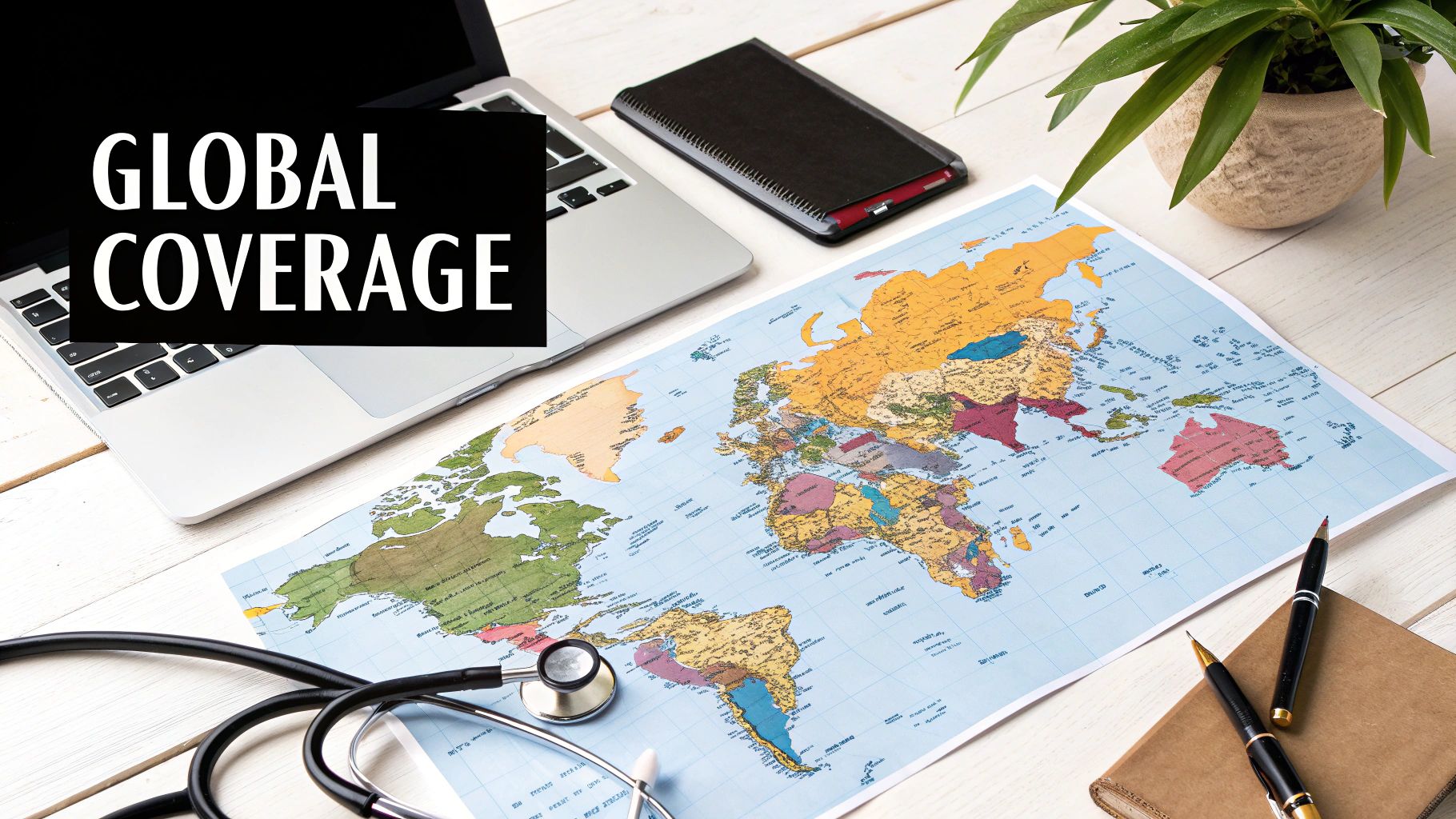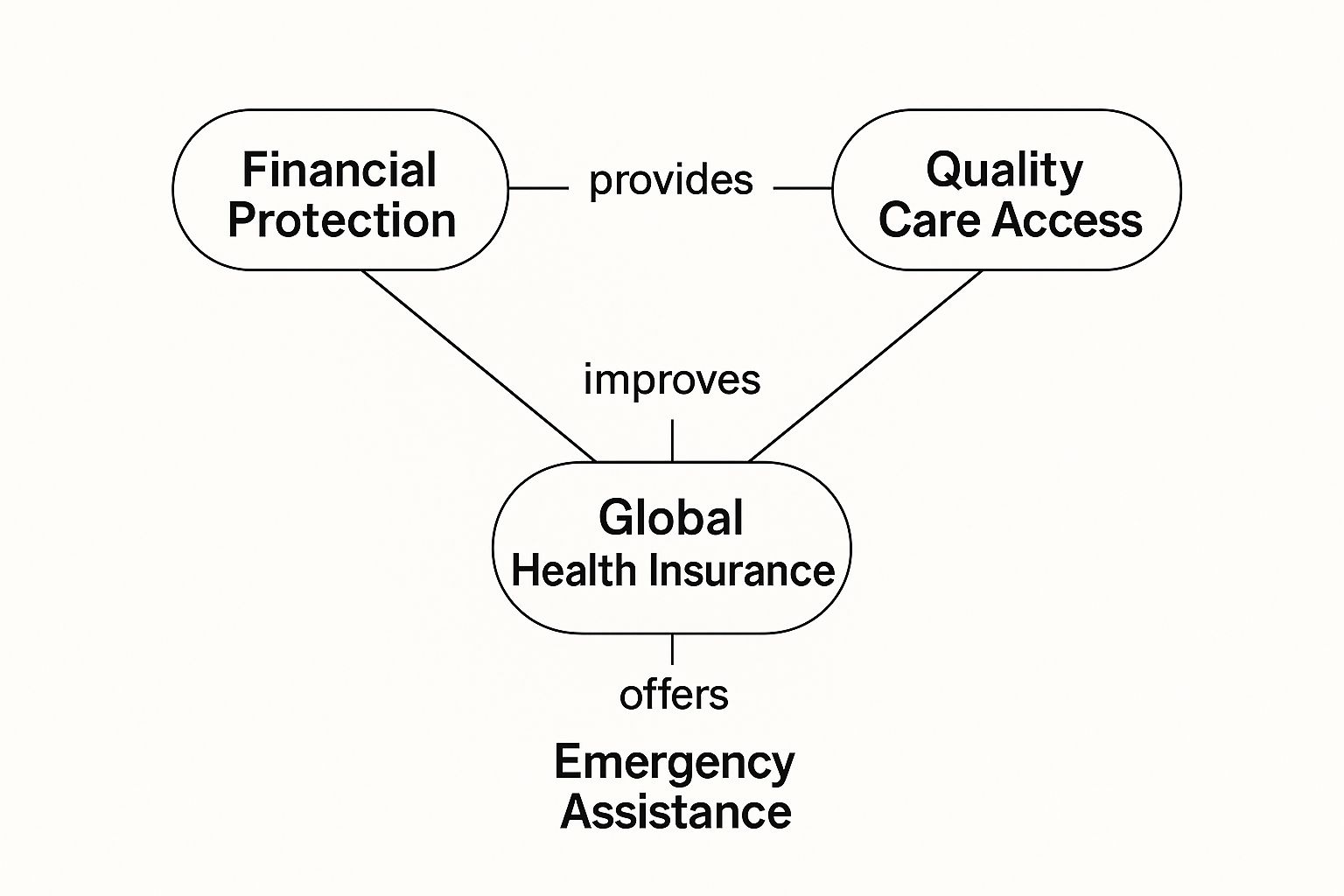For high-net-worth individuals and global professionals, a standard domestic health plan isn't just insufficient—it's a critical liability. You require a strategic asset designed for a borderless lifestyle. This is where global health insurance, often called International Private Medical Insurance (IPMI), becomes indispensable. It is engineered to ensure seamless access to premier medical care, safeguarding both your health and your financial portfolio from the risks of international medical emergencies.
Protecting Your Health Across Borders

When your personal and professional lives cross national boundaries, relying on domestic health insurance is an untenable risk. These plans are tethered to a single country's healthcare system, leaving you exposed the moment you travel.
An unexpected illness or injury abroad can quickly escalate into a logistical and financial challenge. This is precisely the gap that global health insurance is designed to fill. It’s not a temporary travel policy or a superficial add-on; it's a primary health plan built for an international life. It provides the freedom to choose top-tier doctors and hospitals anywhere within your designated coverage area, without compromise.
A Non-Negotiable Asset for a Global Lifestyle
Think of IPMI less as an expense and more as a core component of your global asset protection strategy. It provides certainty in uncertain environments, ensuring a medical issue won't derail your business commitments or personal plans. The market's rapid expansion reflects this growing reality.
The global health insurance market was valued at USD 2.32 trillion in 2023 and is projected to reach approximately USD 4.45 trillion by 2032, exhibiting a compound annual growth rate (CAGR) of 7.5%.
This significant growth signals a clear demand for high-quality, borderless medical security. Of course, while having the right insurance is crucial, it's also wise to know the practical steps to take if you're injured on vacation.
Ultimately, a premier global health plan delivers peace of mind. It allows you to operate with confidence, knowing that no matter where you are—closing a deal in Singapore, vacationing in the Alps, or residing in London—your health is protected by a plan that moves with you.
How International Medical Insurance Works
Let’s be precise. International Private Medical Insurance (IPMI) is not merely an enhanced travel insurance policy. It is an entirely different class of asset, engineered for a life without borders.
Consider it less an insurance policy and more a diplomatic passport for your health. It grants you privileged access to high-quality medical care, irrespective of your global location. While a typical domestic plan tethers you to a network in a single country, a true global health insurance policy is designed for mobility.
Its fundamental purpose is to provide two things: financial security and the freedom to choose the best care available, wherever that may be. When you require medical attention, you are not constrained by a limited list of in-network providers. You can select from a wide array of top-tier hospitals and specialists across your entire region of coverage.
The Mechanics of Access and Payment
How does this function in practice? The key is in the direct settlement process.
With a high-quality IPMI plan, the insurer pays the hospital directly for any covered treatments. This is a crucial distinction. It means you do not have to personally finance massive sums and then navigate a bureaucratic reimbursement process. During a medical event, your focus should be on recovery, not on paperwork and international bank transfers.
These plans are structured to handle significant medical events that can accumulate costs with alarming speed. The non-negotiable features you will always find include:
- Comprehensive Worldwide Coverage: This gives you access to care in multiple countries, designed around where you live, work, and travel.
- Emergency Medical Evacuation: Should you find yourself in a location with inadequate medical facilities, this feature is your lifeline. It covers the cost of transporting you to the nearest appropriate center of medical excellence. This is absolutely critical if you reside or travel in more remote locations.
- 24/7 Multilingual Assistance: Think of this as your personal health concierge. It’s a dedicated support line that assists you in finding approved doctors, understanding foreign healthcare systems, and managing all the logistics, day or night.
This image effectively illustrates the three pillars that define a robust global health plan.

It shows how these plans weave together financial security, direct access to the best care, and critical emergency support into a single, cohesive safety net. To delve into the specifics, you may wish to learn more about International Private Medical Insurance.
Ultimately, IPMI is far more than just a reactive tool for when things go wrong. It’s a proactive strategy for taking control of your health on a global stage. It provides the certainty you need to pursue your ambitions, whether personal or professional, without letting geography dictate the quality of your healthcare.
Essential Features of a Premier Global Health Plan

When evaluating a global health insurance plan, you must distinguish between a standard policy and truly exceptional coverage. For an individual with significant assets and a mobile lifestyle, certain features are non-negotiable.
These are not luxuries; they are the core components that shield both your health and your wealth from the kind of significant medical events that can derail everything.
A superior plan goes far beyond covering emergencies. It provides a solid framework for managing your health long-term, no matter where your career or personal life takes you. This ensures your coverage is as mobile and resilient as you are.
Foundational Pillars of Elite Coverage
The absolute bedrock of any top-tier IPMI plan is its core benefits. These features are the foundation of your protection and must be scrutinized with precision. Without them, even a high-premium plan can leave you dangerously exposed when you need it most.
Here are the non-negotiables:
- Guaranteed Lifetime Renewability: This is arguably the most critical feature. It contractually prevents the insurer from discontinuing your coverage due to your age or a change in your health status. It guarantees continuous coverage.
- High Annual Limits: Serious medical care, especially in top-tier facilities, can generate costs well into six or seven figures. A high annual limit, typically in the millions of dollars, is essential to prevent a medical crisis from becoming a financial one.
- Comprehensive Inpatient and Outpatient Benefits: Your plan must cover the full spectrum of care. This includes everything from major surgery requiring a hospital stay (inpatient) to specialist consultations, diagnostic scans, and prescription drugs (outpatient) without restrictive sub-limits.
An exceptional global health insurance plan acts as a financial firewall. It is structured to absorb the immense costs of world-class medical treatment, so your personal capital remains dedicated to its intended purpose—growth and legacy.
Advanced Provisions for a Global Lifestyle
Beyond the fundamentals, elite plans offer features that address the real-world logistics of living and working abroad. These are not just about paying bills; they provide critical support during a health crisis.
One of the most vital advanced features is medical evacuation. If you become ill or injured in a location without adequate medical facilities, this benefit covers the cost of moving you to a recognized center of excellence. For anyone who travels or lives in developing or remote locations, this is an indispensable safety net that guarantees access to the best possible care.
Additionally, top-tier plans often include robust wellness benefits, covering services like annual health screenings and preventative care. This reflects a proactive approach to health management, not just a reaction to illness. The global health insurance market is continuously evolving, and you can learn more about these global health insurance market trends to see where the industry is headed.
Understanding Regional Coverage and Cost
In the world of premier global health insurance, geography is a primary factor that drives your premium. Your chosen ‘area of coverage’ isn't just a line item on your policy; it's the engine determining its cost, directly reflecting the price of healthcare in the regions to which you require access.
Think of it as you would real estate. A policy that includes access to the world’s most expensive healthcare markets will invariably carry a higher price tag. This is not arbitrary. Insurers must price policies to cover the substantial potential claims originating from these high-cost territories.
The USA and Its Impact on Premiums
The single most significant variable in the cost of global health insurance is whether you include coverage for the United States. The U.S. healthcare system operates on a scale and cost structure unlike any other, making it the most expensive territory to add to any plan.
This is driven by its market size and uniquely high medical costs. To put this in perspective, the U.S. health insurance market was valued at an estimated USD 1.4 trillion in 2023 and is projected to continue its substantial growth. The financial mechanics of its system and high procedural costs dramatically inflate premiums for any policy that includes it. You can explore more data on this influential market to grasp its full impact.
A plan that includes U.S. coverage can easily be double the price of one that excludes it. For a high-net-worth individual who travels to the U.S. for only a few weeks per year, maintaining worldwide coverage year-round is often an inefficient allocation of capital.
Strategically Choosing Your Coverage Area
Beyond the U.S., other territories also have major cost implications. Jurisdictions such as Switzerland, Hong Kong, and Singapore are known for their world-class—but very expensive—medical systems. Including them will raise your premium, though typically not as dramatically as adding the United States.
Conversely, regions like Southeast Asia (excluding Singapore) and a large portion of continental Europe offer an excellent standard of private healthcare at a much more sensible price point.
Designing a policy that covers these high-quality regions while strategically excluding the most expensive ones can lead to significant premium savings. You retain the high quality of care you expect, without paying for access you may not utilize. The key is to tailor your policy to your actual lifestyle—where you reside and where you travel—so you are only paying for the access you genuinely require.
How to Select the Right IPMI Plan
Choosing the right International Private Medical Insurance (IPMI) is not about selecting a plan from a brochure. It’s akin to commissioning a custom financial and medical security instrument.
Your policy must be a direct reflection of your lifestyle, travel patterns, and long-term objectives. A rushed decision can result in dangerous coverage gaps or excess expenditure on benefits you will never use.
The process begins with a rigorous and honest assessment of your specific needs. You must be precise about where your life is headed and what you expect from your healthcare, both now and for the long haul.
Conduct a Personal Needs Audit
Before reviewing any insurance proposals, you must audit your personal and professional life. Answering these questions with absolute clarity is the foundation of your search. This prevents you from paying for unnecessary features and ensures you do not overlook coverage that is critical.
- Family Planning: Do you plan to start or grow your family? Comprehensive maternity benefits, covering everything from prenatal to postnatal care, are a specialized feature that must be identified from the outset.
- Health History: Do you or any family members have pre-existing medical conditions? Complete transparency during the medical underwriting process is paramount. This is the only way to guarantee that future claims will be processed without dispute.
- Travel Frequency and Destinations: Where do you actually travel? Be specific about your itinerary, especially if it includes high-cost countries like the United States, Switzerland, or Hong Kong. This directly shapes your required area of coverage and, consequently, your premium.
Vet the Insurer Thoroughly
Once you have a crystal-clear picture of your needs, your focus must shift to the provider. The quality of the insurance company is as critical as the policy itself. A plan is only as good as the insurer's ability—and willingness—to pay claims efficiently and deliver flawless service during a crisis.
Your relationship with an insurer is a long-term strategic partnership. Evaluate their reputation for claims efficiency, the responsiveness of their client service team, and the breadth of their direct-billing hospital network. A seamless claims experience is a non-negotiable feature.
Beyond the insurer's reputation, you need to understand how to manage your premiums strategically. This involves using financial levers like deductibles (the amount you pay before the insurer contributes) and cost-sharing agreements. By structuring these elements intelligently, you can reduce your annual premium without compromising the essential protection your coverage provides. For more ideas on structuring your plan, you can explore different types of policies for expats.
The end goal is to make a confident, well-informed decision. A properly chosen global health insurance plan doesn’t just protect your health—it slots perfectly into your sophisticated financial strategy.
A Strategic Investment in Your Global Future

Let's be clear: viewing a top-tier global health insurance plan as a mere expense is a fundamental miscalculation. It is not a defensive line item on a budget; it is a core component of any serious wealth protection strategy for individuals who operate on the world stage. Think of it as a financial firewall, ensuring a medical crisis in a foreign country does not impact your personal capital or your family's legacy.
This level of coverage is about more than just settling hospital bills. It is about empowerment. It insulates your hard-earned assets from the kind of unexpected, high-cost health events that can derail a lifetime of financial planning. This preserves your capital for its intended purpose—investment, growth, or securing your family's future. It's a strategy that works in concert with other forward-thinking decisions, such as exploring a Portugal Residency by Investment to secure your global footing.
Securing Your Most Valuable Asset
Your greatest asset is not your portfolio or your business—it is your health. Your ability to generate wealth and pursue opportunities around the globe is directly tied to your well-being. By securing comprehensive global health coverage, you are making a direct investment in that primary asset. It is the kind of bedrock security that allows you to operate with total confidence, knowing you are protected regardless of your location.
Investing in the right global health insurance isn't about preparing for the worst. It's about enabling the best. It gives you the certainty to pursue your ambitions without reservation, knowing your most valuable asset—your health—is secure, no matter where your work and life take you.
Ultimately, this decision is not a cost. It is a foundational piece of a resilient, international lifestyle. It guarantees you can say "yes" to elite medical care without hesitation, safeguarding your future, your finances, and your peace of mind.
Frequently Asked Questions About Global Health Insurance
When you're evaluating the specifics of international medical plans, several key questions invariably arise. Obtaining precise answers is the only way to feel confident about your selection. Let's address some of the most common inquiries.
How Do These Plans Cover Pre-Existing Conditions?
This is a critical point, and insurers' approaches vary.
The best global health insurance plans utilize full medical underwriting. This is a transparent process where you disclose your complete health history. The insurer then reviews this information and can agree to cover your known conditions from the start, sometimes with a premium adjustment.
Another method some policies use is a moratorium. This involves a waiting period, typically 24 months. If you remain free of symptoms, treatment, or advice for that condition during the entire period, it may become eligible for coverage. For high-net-worth professionals who require certainty, full medical underwriting is almost always the superior choice. It provides total clarity and security from day one.
Choosing a plan with full medical underwriting offers the greatest transparency. It ensures that any health conditions are accounted for upfront, preventing claim disputes and ensuring your coverage is ironclad when you need it most.
What Is the Difference Between Travel and Global Health Insurance?
This is a common point of confusion, but the two are fundamentally different products.
Think of travel insurance as a tool for short-term, unexpected travel disruptions—lost luggage, a cancelled flight, or an acute emergency illness during a trip. It is designed for emergencies, not for managing your ongoing health.
Global health insurance, by contrast, is your primary health plan for an international life. It is comprehensive, long-term coverage. It handles everything from annual check-ups and specialist consultations to major surgery or the management of a chronic condition. For a deeper dive into common questions, our extensive global health insurance FAQ has more answers.
Can I Maintain Coverage If I Return to My Home Country?
Yes, and this feature, known as portability, is a core benefit of premium IPMI plans. A true global health insurance policy is designed to move with you. If you decide to relocate back to your country of origin, your coverage can accompany you, uninterrupted.
This is incredibly valuable, particularly if you have developed any health conditions while abroad. It guarantees you can continue your care under a plan you already know and trust. You will simply need to confirm the exact terms in your policy, as the specifics of home-country coverage can vary slightly between insurers.
At Riviera Expat, we specialize in providing crystal-clear guidance on securing the right global health insurance for your specific needs. We eliminate complexity so you can make decisions with complete confidence. Book a free consultation today.

